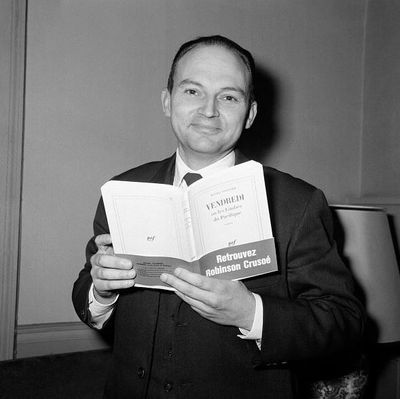Michel Tournier RIP
Michel Tournier, 1967 (Photo by Keystone-France\Gamma-Rapho via Getty Images)
By ADRIAN TAHOURDIN
Michel Tournier, who died on January 18 aged ninety-one, twice failed his agr��gation in philosophy. This put paid to a career in France���s higher education establishment. He was wont to say that had he passed the exam he would never have written his novels. Three cheers for failure!
In his autobiography Le Li��vre de Patagonie (2009; The Patagonian Hare, translated by Frank Wynne), the filmmaker Claude Lanzmann talks of how, in 1946, Tournier persuaded him to join him in studying philosophy at the University of T��bingen in the French occupied zone of Germany. Tournier writes in his own intellectual autobiography Le Vent Paraclet (1977; The Wind Spirit) of how the small university town was, miraculously, completely spared the destruction wrought by the war (having gone there for three weeks, Tournier stayed for four years; Lanzmann, meanwhile, moved on to Berlin, where he was to teach at the Freie Universit��t, which he described as a ���den of Nazis��� at the time). In T��bingen, French students were entitled to a grant and sixty meals per month in the Maison de France, as well as accommodation. As Lanzmann writes, ���Germany was for [Tournier], as it was for us, the country of philosophy and we never envisaged its banishment��� from the community of nations.
Lanzmann goes on: ���But it was with the future author of Vendredi ou les limbes du Pacifique [Friday, or the Other Island], Le Roi des aulnes [The Erl-King] and Les M��t��ores [Gemini] that I spent most of my free time. Tournier was from a family of German scholars, spoke the language fluently and, as a child, had spent time in Hitler���s Germany. He rode and encouraged me to go with him. There was a military riding school in T��bingen run by a Colonel Whitechurch. I joined up, and, under the tutelage of a former Wehrmacht instructor continually barking insults and orders, I learned to perform riding figures, to ride bareback, to dismount a horse at full gallop . . . ".
Tournier, a Germanophile, boasted that he was probably the ���only French person to possess the complete works of Kant in German���, which he had bought in Paris during the Occupation. He translated Erich Maria Remarque, among other German authors.
We learn from Lanzmann that there were two sides to the essentially private Tournier: he had ���a jovial, hail-fellow-well-met, barrack-room buddy side; he was succinct and clear-thinking, but would suddenly, without warning, become absent, swallowed up by who knew what abyss. This was a different Tournier, one prey to bouts of bleak isolation that could last for hours or days, though it was probably in this crucible that the malign reversals of the dark, dizzying masterpieces he would write one day were forged���.
The first of those ���dizzying masterpieces���, Vendredi (1967), appeared when the author was forty-three. His output wasn���t vast ��� there were nine novels (arguably two of them masterpieces), a handful of stories and a few essays. But he was involved in other activities: as a judge for the Goncourt prize for many years; co-running a photography gallery in Arles; travelling widely. Having successfully reworked Vendredi as a book for a young readership, he also spent a lot of time visiting schools and preaching the wonder of fiction.
I commented in an earlier post that I sensed Tournier hadn���t really had his due in Britain. Slightly confirming my suspicions is the fact that no obituary (apart from one online in the Guardian) has appeared here yet. This strikes me as an oversight.
Peter Stothard's Blog
- Peter Stothard's profile
- 30 followers




